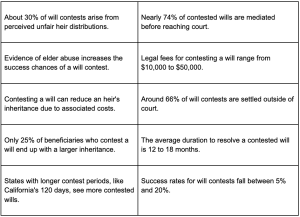
Early Retirement: Pros and Cons
June 16, 2024
Medicaid for Married Couples (Eligibility and Planning)
July 15, 2024How to Contest A Will: Introduction
To contest a will during probate, you must file a petition in probate court citing legal grounds such as undue influence, lack of capacity, fraud, or improper execution. Each state has unique forms – so check with the probate court office or seek professional assistance.
Contesting a will means legally challenging its validity during the probate process. Someone might contest a will if they believe it doesn’t reflect the true intentions of the deceased or was made under improper circumstances. This process can impact the distribution of the estate and involves legal procedures to ensure fairness.
After the passing of a loved one, legal issues surrounding the will is the last thing anyone wants to deal with. Unfortunately, these situations are not uncommon. Misunderstandings, incomplete records, negligence, and greed can all lead to a contested will.
Montana Elder Law has many years of experience in probate law in Montana. Our track record of success speaks for itself. Our clients are our neighbors and we pride ourselves on our expertise and client-focused approach.
Key Takeaways
- Legal Grounds: Undue influence, lack of capacity, fraud, and improper execution are common reasons to contest.
- Who Can Contest: Typically, beneficiaries and heirs.
- Timeframe: Contesting must be done within a specific period after the will is submitted to probate.
- Outcomes: The will could be upheld, modified, or invalidated.
- Legal Help: An experienced attorney is essential for navigating this complex process.
Facts and Stats: Contesting A Will
How to Contest a Will: Legal Grounds
Various legal grounds exist for contesting a will.
One major ground is undue influence.
This occurs when someone exerts excessive pressure on the testator, causing them to act against their free will. Evidence often includes changes in the will that disproportionately favor one person.
Another ground is lack of testamentary capacity.
A person must be of sound mind when making a will. They must have a clear understanding of the nature of their assets and the impact of their decisions. If a will is created when the testator is mentally incapacitated, it can be challenged.
Fraud is another significant ground.
This happens when someone deceives the testator into including provisions that they wouldn’t have otherwise.
Lastly, improper execution can be a ground for contesting a will if the legal formalities required for creating a valid will are not followed. This includes issues like lack of proper witnessing or signing.
Who Can Contest a Will?
To contest a will, a person must have standing. This means they must be directly affected by the will’s outcome. Generally, eligible individuals include:
- Beneficiaries: Those named in the will.
- Heirs: Family members who would inherit if there was no will.
- Others with Standing: Individuals who can prove they have a valid interest in the estate.
Steps to Contest a Will in Probate
Filing a Petition
The first step is filing a petition in probate court.
This petition must outline the grounds for contesting the will and provide evidence supporting the claim.
It sets the legal process in motion and notifies the court and all interested parties. (1)
Gathering Evidence
Gathering evidence is crucial to support the contest.
This may include medical records to prove lack of testamentary capacity, witness testimonies to demonstrate undue influence, or documents showing fraud.
The strength of the evidence can significantly impact the case outcome.
Court Hearings
Court hearings involve presenting the evidence to a probate judge. Both sides have the opportunity to argue their case.
The judge evaluates the evidence and makes a decision based on the merits of the contest.
These hearings are critical in determining the validity of the will.
Mediation and Settlement
Mediation offers a chance to resolve disputes without going to trial.
During mediation, a neutral third party helps the involved parties reach a settlement. This process can save time and legal costs, and it often leads to a mutually agreeable solution.
How to Contest a Will: Timeframe
Timing is essential when contesting a will. Statutory deadlines vary by state, and missing these deadlines can forfeit the right to contest.
Acting promptly ensures that the contest is filed within the legal timeframe.
Steps and Timeline from Filing to Final Resolution
- File the Petition: Immediately after the will is submitted to probate.
- Notify Interested Parties: Within a few weeks of filing the petition.
- Gather Evidence: Ongoing process that starts immediately.
- Preliminary Hearings: Typically scheduled within a few months.
- Mediation (if applicable): Can occur anytime before the final hearing.
- Final Hearing: Usually within six months to a year from filing.
- Judge’s Decision: Issued shortly after the final hearing.
Potential Outcomes of a Will Contest
Contesting a will can lead to several outcomes.
The will might be upheld, meaning it remains valid as written.
Alternatively, the court could invalidate the entire will or specific provisions, leading to the estate being distributed according to previous wills or state laws of intestacy.
Sometimes, parties reach a settlement, avoiding further legal disputes.
Comparison of Outcomes and Implications for Beneficiaries
| Outcome | Description | Implications |
| Will Upheld | The court finds the will valid as is. | Estate distributed per will’s terms. |
| Will Invalidated | The will is deemed invalid; estate distributed per prior will or intestacy laws. | Potential changes in inheritance shares. |
| Settlement Reached | Parties agree on a distribution plan outside of court. | Often quicker, potentially more satisfactory. |
Challenges and Risks in Contesting a Will
Contesting a will presents several challenges.
Legal costs can be significant, and there is always the risk of losing the case.
Additionally, the emotional toll can be high, straining family relationships. Family conflict is a common consequence, as disputes over inheritance can lead to lasting discord.
Mitigating these risks involves careful planning and realistic expectations.
Consulting with a knowledgeable attorney can provide a clear understanding of the likelihood of success and potential costs.
Open communication with family members may also help manage expectations and reduce conflict.
How to Contest a Will: Role of an Attorney
Contesting a will may come with some hurdles. We recommend at least consulting with an attorney experienced in probate law.
An experienced lawyer understands the legal grounds and procedural requirements, providing essential guidance through each step of the process.
They can help gather evidence, represent you in court, and negotiate settlements, significantly increasing your chances of a favorable outcome.
Benefits of Having an Attorney vs. Self-Representation
| Aspect | With Attorney | Self-Representation |
| Legal Knowledge | In-depth understanding of probate law. | Limited or no legal expertise. |
| Evidence Gathering | Professional assistance in compiling necessary documents and testimony. | Potential difficulty in gathering sufficient evidence. |
| Court Representation | Skilled advocacy during hearings. | Potential disadvantage against experienced legal opponents. |
| Negotiation and Mediation | Strong negotiation skills for settlements. | Limited ability to negotiate effectively. |
How to Contest a Will Explained: Montana Elder Law
Contesting a will involves understanding specific legal grounds, following a structured process, and being prepared for various outcomes. It’s important to be aware of the potential challenges and risks, such as legal costs and family conflict, and to take steps to mitigate them.
Montana Elder Law is here to help. With our expertise and dedication, you can confidently advocate for the true wishes of the deceased. We will listen to everything you have to say and provide the most sound legal advice in Montana.
Trust us to provide the legal support you need during this challenging time.
Reference:
(1) LawHelp.org, FAQs About Wills, https://www.lawhelp.org/dc/resource/frequently-asked-questions-about-wills


